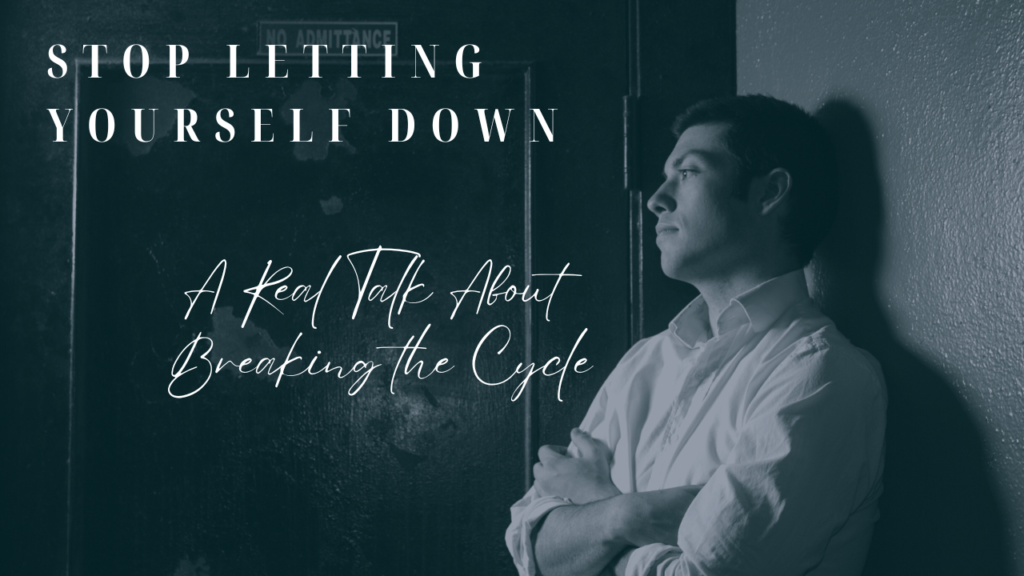There comes a point when the biggest disappointment in your life isn’t what someone else did to you—it’s what you keep doing to yourself. You make promises you don’t keep. You talk a good game. You feel motivated at night, but then morning comes and it’s the same story: hit snooze, delay the hard thing, escape into something that numbs, and tell yourself you’ll start fresh tomorrow.
And you might.
But then the cycle repeats.
It’s subtle, which is why it’s so dangerous. Because you’re not doing something obviously destructive. You’re just letting things slide. You’re drifting. You’re avoiding the mirror. You’re not living in full rebellion—but you’re not living in full obedience either. You’re stuck in the in-between, where nothing explodes but everything aches.
Deep down, you know you were made for more than this.
But knowing and doing are not the same.
You’re not lazy. You’re not broken beyond repair. You’re not incapable. But you’ve gotten used to disappointing yourself. And now the voice in your head doesn’t even sound like a critic—it sounds like truth.
It says, “You always quit.”
“You can’t follow through.”
“You never change.”
But that’s not the truth. That’s just the story you’ve told yourself for so long, it’s started to sound like your identity.
It’s not.
And you can stop letting yourself down.
Not by becoming perfect. But by choosing to show up anyway.
The Excuses Sound Noble, But They’re Still Excuses
It’s easy to justify inconsistency when you’re overwhelmed. Life is full. You’re tired. You’ve got responsibilities. You don’t want to burn out. You’re not sure it’s the “right time.” So you delay. You plan. You dream. You prepare. But you don’t move.
And you call it wisdom.
But sometimes it’s not wisdom. It’s fear.
Fear of failing. Fear of succeeding. Fear of what it’ll cost. Fear of being seen trying.
So you talk around the thing instead of doing the thing. You pray for motivation, clarity, energy—hoping one of them shows up first so you don’t have to take that awkward, uncertain first step.
But the truth is, clarity doesn’t usually come before movement. Neither does motivation. You want to feel your way into action, but most of the time, it works the other way around. You act your way into momentum. You show up tired. You do it messy. You start even when it’s small.
And that’s where you start breaking the cycle.
You stop letting yourself down when you stop waiting to feel ready.
You Can’t Build Confidence Without Keeping Your Word to Yourself
You want to trust yourself again? Keep your word. Especially the quiet promises. The private ones no one else knows about. The commitments you make when no one’s watching.
The more you break those, the harder it is to believe in your own follow-through. And it doesn’t matter how many vision boards or plans you have—if your brain doesn’t believe you’ll actually do what you say, it’ll sabotage every good intention before it starts.
This isn’t about being perfect.
It’s about rebuilding integrity with yourself.
You don’t need to conquer everything today. But you need to stop negotiating with your excuses. Stop making emotional decisions in moments that require discipline. Stop expecting change while living exactly the same.
Small wins matter. Doing one hard thing today, even if it’s tiny, sends a message: I’m not letting myself down anymore.
And that starts to shift everything.
Stop Looking for a Way Out and Start Looking for a Way Through
Most of the time, what keeps you stuck isn’t the problem—it’s your obsession with avoiding discomfort. You want to feel good while changing. You want to stay safe while growing. You want transformation without friction.
But you don’t get stronger by escaping pain. You get stronger by facing it with purpose.
The habits you’re trying to break? They’re not random. They’ve been protecting you. Or at least pretending to. The scrolling, the eating, the hiding, the procrastinating—it’s all a shield. A way to stay numb, distracted, safe.
So of course it’s hard to change. Because change feels like danger to your nervous system.
But hard doesn’t mean impossible.
It means you need courage—not comfort.
It means you need to stop asking for shortcuts and start asking for strength.
And it means you have to stop praying for God to remove the mountain if He’s trying to teach you how to climb it.
Discipline Is Not Punishment—It’s Freedom
Somewhere along the line, you started believing that structure was suffocating. That rules would ruin your joy. That discipline was harsh and unkind. So you rebelled against it, thinking freedom was found in doing whatever you wanted whenever you wanted.
But that kind of freedom? It’s a lie. Because now you’re stuck. You’re not thriving. You’re surviving—barely. Your time is scattered, your mind is cluttered, your peace is fractured.
That’s not freedom. That’s bondage with a flattering label.
Real freedom isn’t doing whatever you feel like. It’s having the strength to do what’s right—even when you don’t feel like it.
Discipline creates space for peace. It makes room for rest. It builds habits that carry you when motivation disappears.
You don’t need a tighter grip. You need a better rhythm. One that honors who you’re becoming—not just who you’ve been.
You Can’t Keep Letting Yesterday Decide Today
Maybe you’ve failed before. Maybe you’ve started things and quit. Maybe your track record looks like a long list of almosts, half-dones, and never-followed-throughs.
But today isn’t yesterday.
And you can’t keep dragging all that regret into every new morning.
If God’s mercies are new every day, why do you keep carrying shame He already let go of?
You stop letting yourself down when you stop letting your past call the shots. When you stop treating old mistakes like they’re permanent identity markers. When you stop disqualifying yourself from growth because you didn’t get it right the first hundred times.
That’s not weakness. That’s humanity.
What matters is what you do now.
Not what you wish you’d done.
Not what you should’ve done.
Just now.
Right here.
Right where you are.
Start Where It Hurts, Stay Where It’s Hard, Finish What You Started
This is it. The real stuff. The quiet decisions that no one applauds. The daily faithfulness that builds a life of integrity. The showing up when it would be easier to scroll, sleep in, or excuse it away.
You start where it hurts—whatever you’ve been avoiding, whatever you know is holding you back.
You stay where it’s hard—because that’s where strength is forged.
And you finish what you started—not because it’s easy, but because you’re not living for comfort anymore. You’re living for freedom.
That’s how you stop letting yourself down.
Not with a grand reinvention.
But with simple, stubborn, Spirit-filled obedience.
One day at a time. One choice at a time.
And when you mess up? You repent, not retreat.
You rise, not repeat.
Because this time, you’re not doing it in your own strength.
And that changes everything.



